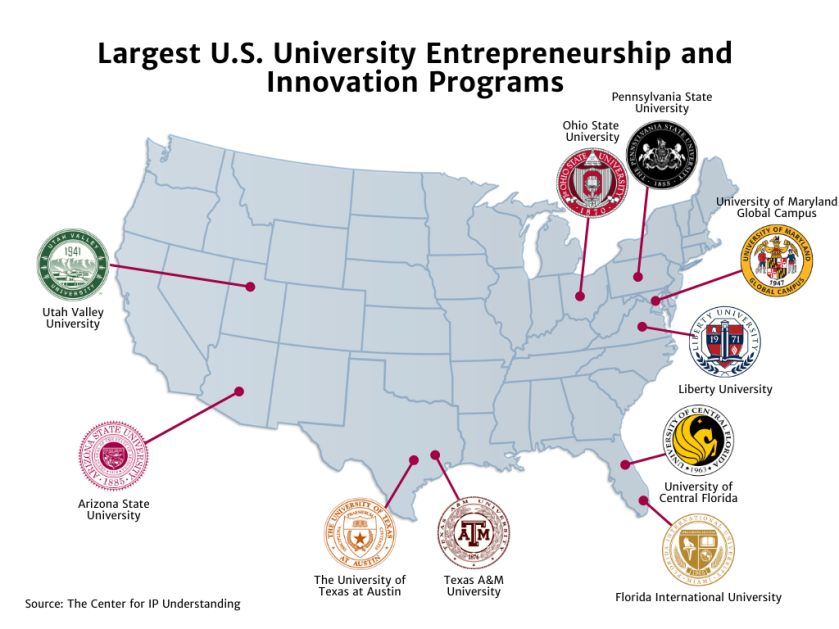For students at several of the largest U.S. university entrepreneurship and innovation (E&I) programs, the idea of intellectual property engagement is changing.
A 31-page report released last week by the Center for Intellectual Property Understanding (CIPU) shows which schools are doing the best job of exposing students to IP rights and making successful entrepreneurship more tangible.
“While the number of students obtaining IP rights for business ideas developed during undergraduate studies is currently low, there are several existing models that educators could consider to improve IP engagement and help their undergraduates identify intangible assets that help to create businesses or build meaningful careers,” wrote CIPU as reported in IPWatchdog.
Take-Aways
One of the main takeaways from the study, “Assessing Intellectual Property Engagement at the Largest U.S. University Entrepreneurship and Innovation Programs,” is that an interdisciplinary environment is key to increasing the success of students when they graduate. Simply having a high innovation ranking was not a determining factor for students engaging in entrepreneurship and IP.

CIPU found that strong entrepreneurship programs had several defining characteristics. Strong programs often include a central hub facility that connects students with resources such as mentorship. The nonprofit also found business pitch competitions and a minor concentration in entrepreneurship at the strong entrepreneurship programs.
Another key factor was in-person learning, as this allows students to better make connections that can be useful in entrepreneurship and IP.
“My idea of patents was very limited going into college. My exposure during my undergraduate studies helped me slowly pick up the skill of how to navigate that world.”
In a 2021 summary report, “IP Education at Business Schools: An Evolving Landscape,” CIPU looked at student exposure to patents, trademarks and trade secrets at the top 20 business and management programs.
About one-third of elite U.S. business schools offer only one course (some do not offer any), and none have an IP requirement to graduate.
Corporate Sponsorship
The OnRamp program at Ohio State University’s Fisher College of Business, which allows students to gain experience in innovation while starting their career path in corporate innovation. The OnRamp program relies on corporate sponsorship, a model that the report says should be implemented at more universities.
“My idea of patents was very limited going into college,” said Anthony Mango, a 2019 graduate of Ohio State University. “My exposure [to IP rights] during my undergraduate studies helped me slowly pick up the skill of how to navigate that world.”
Go here to read the report,“Assessing Intellectual Property Engagement at the Largest U.S. University Entrepreneurship and Innovation Programs.”
Image source: CIPU, http://www.understandingip.org

